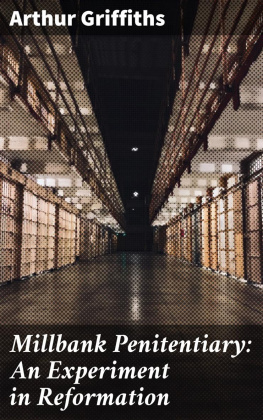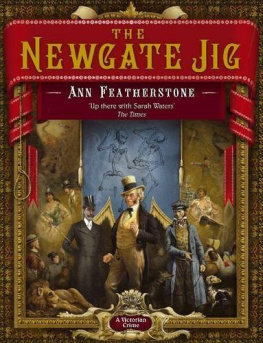Every attempt has been made to replicate the original as printed. Some typographical errors have been corrected; . In certain versions of this etext, in certain browsers, clicking on this symbol will bring up a larger version of the image. (etext transcriber's note) |
The Prison Gate.
The Prison Gate.
THE
CHRONICLES OF NEWGATE
BY
ARTHUR GRIFFITHS
MAJOR LATE 63RD REGIMENT; ONE OF H. M. INSPECTORS OF PRISONS
AUTHOR OF THE MEMORIALS OF MILLBANK, ETC., ETC.
IN TWO VOLUMES.VOL. I.
LONDON: CHAPMAN AND HALL
( Limited )
1884
[All rights reserved.]
Bungay:
CLAY AND TAYLOR, PRINTERS.
PREFACE.
WHEN I undertook the work of which these two volumes are the result, I scarcely realized the extent of the task before me. Now at the termination of my labours, which have extended over a period of nearly five years, I cannot give my work to the public without regret that it has not been accompanied by deeper study and more widespread research. But I have, in truth, been almost overwhelmed by the mass of materials at hand. These always increased enormously with every digression, and I found at length that I must be satisfied with what I had instead of seeking for more. Even with this restriction I have often been compelled to reject much, to epitomize and perhaps unduly abbreviate what I have used. A really copious and detailed history of Newgate would be a most voluminous affair. This well-known prison, which has stood for centuries upon the same site, is in itself an epitome of the criminal history of England; to have traced its chronicles down from epoch to epoch, closely and minutely, would have been wearisome to the reader. There is a family resemblance in crimes in all ages; when, therefore, the more prominent cases have been selected for description, a general impression will have been conveyed of the whole. I have followed this principle throughout, and have endeavoured to present a general, but not too detailed, picture of the various criminal periods through which Newgate has passed.
But the claims of Newgate on the public interest are not limited to the melancholy histories of those whom it has held in durance. Newgate, as the annexe of the Old Bailey, or great criminal law court of this city, has ever been closely connected with the administration of justice in this country. In its records are to be read the variations of our Statute Book. We may trace at Newgate the gradual amelioration of the penal code, from the days of its pitiless ferocity, to the time when, thanks to the incessant protests of humanitarian and philanthropist, a milder system of punishment became the rule. All this has found more than a passing mention in my pages. Again, Newgate, the city jail, the chief prison of the chief town in the kingdom, might have been expected to lead the van in prison reform; that it remained constantly, from the first and almost to the last, one of the worst-kept prisons in the kingdom, reflects but little credit upon those responsible for its management. The fact, however, that crying evils were constantly present in the great jail, brings Newgate at once into close connection with the whole subject of prison reform. To represent Newgate as it existed even before Howard commenced his crusade, and long afterwards, has naturally, therefore, fallen within the scope of my work. Nor have I confined myself strictly to this prison, but I have endeavoured to trace the slow progress of improvement throughout the whole country from first to last.
I cannot conclude these brief remarks without adding a few words of thanks to those who have assisted me in my undertaking. I have received much valuable information from Sidney Smith, Esq., the last Governor of Newgate; from Mr. Mapperson, its last chief warder; and from many other officials of the prison. But most of all am I indebted to my friend, William Linton, Esq., formerly Governor of Petworth and Nottingham prisons, who has long rendered me the most cordial assistance and co-operation. I am also very grateful to my friend, Colonel Goff, for many of the original illustrations which embellish the book.
November, 1883.
INTRODUCTORY CHAPTER.
Brief survey of NewgateThe first gaolIts antiquityIts inmates and general conditionWhittingtons prisonRebuilt after the FireMisgovernment, neglect, and injusticeCapital convicts and executionsFirst dawn of reformA new Newgate built by DanceState of interior continues deplorableMrs. FryThe first inspectors of prisonsAmelioration long insisted upon introduced at lastNewgate closed in 1880.
IN antiquity and varied interest Newgate prison yields to no place of durance in the world. A gaol has stood on this same site for almost a thousand years. The first prison was nearly as old as the Tower of London, and much older than the Bastille. Hundreds of thousands of felons and trespassers have from first to last been incarcerated within. To many it must have been an abode of sorrow, suffering, and unspeakable woe, a kind of terrestrial inferno, to enter which was to abandon every hope. Imprisonment was often lightly and capriciously inflicted in days before our liberties were fully won, and innumerable victims of tyranny and oppression have been lodged in Newgate. Political troubles also sent their quota. The gaol was the halfway-house to the scaffold or the gallows for turbulent or short-sighted persons who espoused the losing side; it was the starting-place for that painful pilgrimage to the pillory or whipping-post which was too frequently the punishment for rashly uttered libels and philippics against constituted power. Newgate, again, was on the high road to Smithfield; in times of intolerance and fierce religious dissensions numbers of devoted martyrs went thence to suffer for conscience sake at the stake. For centuries a large section of the permanent population of Newgate, as of all gaols, consisted of offenders against commercial laws. While fraudulent bankrupts were hanged, others more unfortunate than criminal were clapped into gaol to linger out their lives without the chance of earning the funds by which alone freedom could be recovered. Debtors of all degrees were condemned to languish for years in prison, often for the most paltry sums. The perfectly innocent were also detained. Gaol deliveries were rare, and the boon of arraignment and fair trial was strangely and unjustly withheld, while even those acquitted in open court were often haled back to prison because they were unable to discharge the gaolers illegal fees. The condition of the prisoners in Newgate was long most deplorable. They were but scantily supplied with the commonest necessaries of life. Light scarcely penetrated their dark and loathsome dungeons; no breath of fresh air sweetened the fetid atmosphere they breathed; that they enjoyed the luxury of water was due to the munificence of a Lord Mayor. Their daily subsistence was most precarious. Food, clothing, fuel were doled out in limited quantities as charitable gifts; occasionally prosperous citizens bequeathed small legacies to be expended in the same articles of supply. These bare prison allowances were further eked out by the chance seizures in the markets; by bread forfeited as inferior or of light weight, and meat declared unfit to be publicly sold. All classes and categories of prisoners were herded indiscriminately together: men and women, tried and untried, upright but misguided zealots with hardened habitual offenders. The only principle of classification was a prisoners ability or otherwise to pay certain fees; money could purchase the squalid comfort of the masters side, but no immunity from the baleful companionship of felons equally well furnished with funds and no less anxious to escape the awful horror of the common side of the gaol. The weight of the chains, again, which, till quite recently, innocent and guilty alike wore, depended upon the price a prisoner could pay for easement of irons, and it was a common practice to overload a new-comer with enormous fetters and so terrify him into lavish disbursement. The gaol at all times was so hideously overcrowded that plague and pestilence perpetually ravaged it, and the deadly infection often spread into the neighbouring courts of law.





